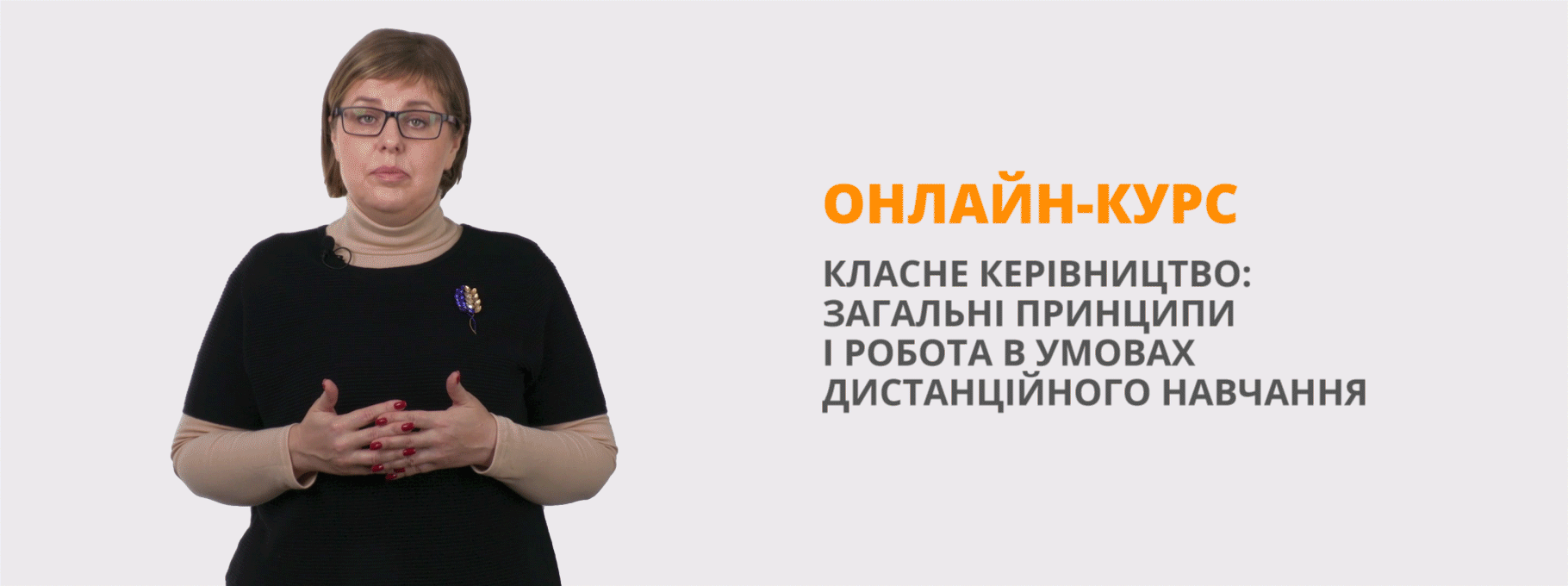Збірник " ENGLISH IN IDIOMS"
АНОТАЦІЯ
Що таке ідіоми? При вивченні англійської мови ми часто стикаємося з стійкими виразами, перевести на українську мову які можливо тільки звернувшись до словника ідіом. Без знання англійських фразеологізмів неможливо повною мірою насолоджуватися читанням оригінальних англійських текстів, і тим більше претендувати на звання серйозного знавця англійської мови. У той же час, використання в мові англійських ідіом та фразеологізмів говорить про глибоке розуміння мови.
Англійські ідіоми не тільки прикрашають мову, вони також дозволяють скоротити громіздкі речення до невеликих стійких виразів (іноді до двох-трьох слів). Мова з використанням англійських фразеологізмів стає більш красивою і стрункою.
Даний посібник розрахований на рівні Intermediate, Upper-Intermediate, Advanced. Тут Ви знайдете не тільки найпоширеніші англійські ідіоми разом із тлумаченням їх значення та їх перекладом на українську мову, але й приклади використання англійських ідіом у мовленні, що роблять цей посібник незамінним помічником учителя як у класі, так і в позакласній діяльності.

Intermediate, Upper-Intermediate, Advanced

Soledar, 2017
АНОТАЦІЯ
Що таке ідіоми? При вивченні англійської мови ми часто стикаємося з стійкими виразами, перевести на українську мову які можливо тільки звернувшись до словника ідіом. Без знання англійських фразеологізмів неможливо повною мірою насолоджуватися читанням оригінальних англійських текстів, і тим більше претендувати на звання серйозного знавця англійської мови. У той же час, використання в мові англійських ідіом та фразеологізмів говорить про глибоке розуміння мови.
Англійські ідіоми не тільки прикрашають мову, вони також дозволяють скоротити громіздкі речення до невеликих стійких виразів (іноді до двох-трьох слів). Мова з використанням англійських фразеологізмів стає більш красивою і стрункою.
Даний посібник розрахований на рівні Intermediate, Upper-Intermediate, Advanced. Тут Ви знайдете не тільки найпоширеніші англійські ідіоми разом із тлумаченням їх значення та їх перекладом на українську мову, але й приклади використання англійських ідіом у мовленні, що роблять цей посібник незамінним помічником учителя як у класі, так і в позакласній діяльності.
English idioms: Weather
a face like thunder = to look very angry: "What's up with him today? He has a face like thunder!"
a fair-weather friend = a friend who doesn't support you in bad times: "I'm a bit disappointed in John and David. It turned out they were only fair-weather friend
a snowball's chance = very little chance (as much chance as a snowball has in hell): "We don't have a snowball's chance of winning that contract!"
a storm in a teacup = a lot of fuss over something small: "Don't worry about those two arguing. it's just a storm in a teacup."
be a breeze = to be easy: "The exam was a breeze."
be snowed under = to be very busy: "We're snowed under at work."
blow hot and cold = to keep changing your attitude: "They're blowing hot and cold over this issue. It's impossible to know what they want!"
brass-monkey weather = very cold weather: "It's brass-monkey weather today. You'd better wrap up warm!"
come rain or shine = whatever happens: "He's always working in his garden – come rain or shine."
the lull before the storm = a quiet time before a busy or difficult time: "It's going to get very busy on Thursday. Today and tomorrow are just the lull before the storm."
save up for a rainy day = put money aside for when you might need it later: "I don't want to spend this extra money. I'll save it up for a rainy day."
see which way the wind blows = to analyse a situation before doing something: "I'm going to see which way the wind blows before asking her about a raise."
steal someone's thunder = do what someone else was going to do and get all the praise: "You'll steal her thunder if you wear that dress tonight!"
take a rain check = postpone something: "I don't really want to go the cinema tonight. Can we take a rain-check on it?"
under the weather = not feel very well: "I'm feeling a bit under the weather at the moment."
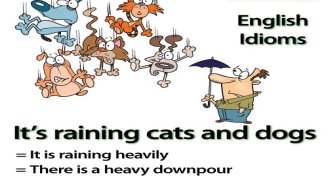 weather the storm = to survive a difficult situation: "This recession is quite serious and it's becoming difficult to weather the storm."
weather the storm = to survive a difficult situation: "This recession is quite serious and it's becoming difficult to weather the storm."
English idioms: Food
be the apple of someone's eye = be someone's favourite person: "She's the apple of her father's eye."
in apple-pie order = in perfect order: "Her house was in apple-pie order, with nothing out of place."
be as nice as pie = be extremely nice and charming, so that you can fool people: "She can be as nice as pie, but don't trust her!"
eat humble pie = have to take back what you said, because you have been proved wrong: "He'll have to eat humble pie now. Serve him right – he tried to make us all look bad."
have your fingers in every pie = be involved in many different things: "You can't do anything without him knowing – he has his fingers in every pie."
a piece of cake = be extremely simple: "This program is a piece of cake to use."
sell like hot cakes = sell quickly in large quantities: "His book is selling like hot cakes."
full of beans = be full of energy: "You're full of beans today – it's nice to see you so lively!"
beef about something = complain about something: "He's always beefing about the pay."
beef something up = give something extra appeal: "If we beef up the window display, more people might come into the shop."
be your bread and butter = be your main source of income: "Although they run a taxi service, car sales are their bread and butter."
be like chalk and cheese = be completely different: "I don't know why they got married – they're like chalk and cheese."
be like peas in a pod = be identical to someone: "Those two are like peas in a pod."
cheesy = predictable and unimaginative: "I don't want to see that film again – it's really cheesy."
sour grapes = say something bad because you didn't get what you wanted: "Don't listen to him complain – it's only sour grapes because you got the job and he didn't."
 play gooseberry = somewhere with a couple who would prefer to be on their own: "I'd rather not come to the cinema with you two – I'd just feel I was playing gooseberry."
play gooseberry = somewhere with a couple who would prefer to be on their own: "I'd rather not come to the cinema with you two – I'd just feel I was playing gooseberry."
a couch-potato = someone who never goes out or exercises: "He watches TV all day – what a couch-potato!"
like butter wouldn't melt in your mouth = appear innocent: "When I asked her about the missing money, she tried to look like butter wouldn't melt in her mouth."
bring home the bacon = earn money for necessary things, like food: "He brings home the bacon in that family."
the way the cookie crumbles = the way things are: "I'm sorry I didn't get the promotion, but that's the way the cookie crumbles."
have someone eat out of your hand = have control over someone: "He has her eating out of his hand – it's sad."
eat someone out of house and home = eat a lot of food: "Her children eat her out of house and home."
eat into your savings = spend some of your savings: "We can't afford a new car, unless we eat into our savings."
eating for two = be pregnant and so eating more: "Good news, darling. The doctor says I'm eating for two now."
eat your heart out! = telling someone they should be jealous of you: "I'm going on holiday to Jamaica – eat your heart out!"
not your cup of tea = something that you don't like much: "Football isn't my cup of tea."
a square meal = a filling meal: "You need a square meal after all that exercise."
it smells fishy = something that is suspicious: "He wants to do all the housework for you? That smells fishy to me!"
small fry / small beer = something or someone unimportant: "Sales last year are small fry compared to now – we're doing really well."
roll out the barrel = prepare to have a good time: "Roll out the barrel – we're celebrating our exam results."
rhubarb, rhubarb = saying something completely unimportant: "There's that politician again on televison – rhubarb, rhubarb."
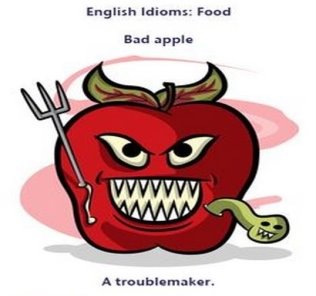
English idioms: Body
The heart
break someone's heart = upset someone greatly: "She broke his heart when she left him."
learn something off by heart = learn something completely: "I've learnt this off by heart – I'm bound to pass the exam!"
you're all heart! = when you tell someone sarcastically how kind they are: "Thanks for giving me all this work – you're all heart!"
hand on heart = promise with sincerity: "Hand on heart, it's the honest truth."
have the heart = be able to give someone bad news: "I didn't have the heart to tell him he'd failed."
a heart of gold = be a very kind person: "She'll always help – she has a heart of gold."
Hands
hand over = pass on something: "Before I leave, I have to hand over all my work."
get out of hand = become impossible to manage: "You'll have to deal with this problem before it gets out of hand."
know something like the back of your hand = know something extremely well: "He knows London like the back of his hand."
have your hands full = be very busy: "I can't do anything about it now – my hands are full."
in hand = under control: "The company report is in hand – you'll have it next week."
live hand to mouth = only earn enough money for food: "After he lost his job, he had to live hand to mouth for a couple of months."
give someone a hand = help someone: "He always gives me a hand with the housework."
have someone in the palm of your hand = have influence over someone: "He's got her in the palm of his hand."
be caught red-handed = be caught doing something bad: "The children were caught red-handed picking the flowers."
Fingers
butter fingers = be clumsy and drop things: "You've dropped my vase! Butter fingers!"
keep your fingers crossed = wish something for someone: "Keep your fingers crossed for me tomorrow – it's my job interview."
under your thumb = control someone: "She's got him under her thumb – he won't do anything without asking her first."
Arms
twist someone's arm = persuade someone: "I didn't want to go out, but he twisted my arm."
cost an arm and a leg = cost a fortune: "The car cost an arm and a leg – it'll take them ages to pay back the loan."
Feet and legs
put your foot in it = say or do something you shouldn't: "I think I've put my foot in it – I told her about the party."
have itchy feet = not able to settle down in one place: "She's going off travelling again – she's got really itchy feet."
keep someone on their toes = keep someone alert: "Our teacher keeps us on our toes – we have to pay attention in class."
stand on your own two feet = be independent: "I don't need your help – I can stand on my own two feet."
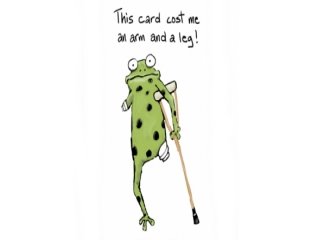 have two left feet = be awkward or clumsy: "He's a terrible dancer – he's got two left feet!"
have two left feet = be awkward or clumsy: "He's a terrible dancer – he's got two left feet!"
walk on eggshells = be careful about what you say or do: "She's in a terrible mood – you'll have to walk on eggshells around her."
foot the bill = pay the bill: "He had to foot the bill for the party."
The back
go behind someone's back = do something secretly: "She went behind my back and told my boss I wanted a new job."
back off = stop trying to force someone to do something: "Will you just back off and let me decide what I should do!"
back down = accept defeat: "He finally backed down and let me buy a pet rabbit."
back someone up = support someone: "Thank you for backing me up in the meeting."
put your back into something = work very hard at something: "She put her back into it and got good results."
stab someone in the back = betray someone: "Be careful of him – he'll stab you in the back if it gets him what he wants."
Idioms that use part of the face
face-to-face = in person: "We need to arrange a face-to-face meeting."
face the music = take responsibility for a difficult situation: "We've got to face the music – this company is going under."
face up to responsibilities = accept responsibilities: "You need to face up to your responsibilities – it's time you got a job and started to save money."
be two-faced = be hypocritical: "I can't believe she told you that she likes Harry – she told me she hates him! She's so two-faced!"
Ears
be all ears = listen attentively: "So, you've got an idea. I'm all ears."
have an ear for = be good at music: "He's doing well in his piano lessons – he's definitely got an ear for music."
keep your ears to the ground = listen out for something: "I'll keep my ears to the ground – the next time I hear someone wants to rent out a flat, I'll let you know."
up to your ears in something = be extremely busy: "I'm sorry I can't come out this weekend – I'm up to my ears in work."
Eyes
keep your eyes peeled = watch extremely attentively: "Keep your eyes peeled for him – he's in the crowd somewhere."
keep an eye out for = watch for someone or something: "Keep an eye out for the next turning on the left."
eye up = look at someone because you think they look nice: "Whenever she goes to a club, she always gets eyed up by older men."
have your eye on something / someone = want someone or something: "I've got my eye on a new computer."
have eyes in the back of your head = warn someone that you can see exactly what they are doing: "Don't make those signs at me – I've got eyes in the back of my head!"
see eye to eye on something = agree with someone: "Those two don't always see eye to eye – they often argue."
Other parts of the face
stick your nose in = get involved in something or someone else's business: "I wish she wouldn't stick her nose in like that – I really don't want anyone else's help."
on the tip of my tongue = when you've forgotten the word you want to say: "What's the word for it – it's on the tip of my tongue…"
tongue-tied = when you can't say anything because you feel shy: "She's tongue-tied when she has to speak in public."
by the skin of my teeth = just manage to do something: "He got out of the burning building by the skin of his teeth."
cut your teeth on something = where you learn to do something: "He's the best man to run the company – he cut his teeth in the Production Department and ran it successfully for years."
teething problems = start-up problems with a new project: "We're having teething problems with our distribution systems.
have a cheek = be disrespectful: "He's got a cheek saying you never help him – I saw you writing his report for him!"
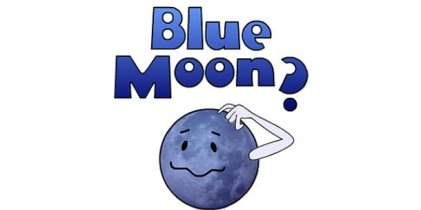 a frog in my throat = when your throat tickles and makes you cough: "Sorry I can't stop coughing – I've got a frog in my throat."
a frog in my throat = when your throat tickles and makes you cough: "Sorry I can't stop coughing – I've got a frog in my throat."
stick your neck out = do or say something that might have negative results: "I'm going to stick my neck out and say what I think."
be up to your neck in = be in a difficult situation: "He's up to his neck in debt."
breathe down someone's neck = check constantly what someone else is doing: "I can't write this letter with you breathing down my neck!"
Idioms that use parts of the head
head to head = in a race, when two contestants are doing as well as each other: "They are head to head in the polls."
off the top of your head = when you give an answer to something without having the time to reflect: "What's our market strategy?" "Well, off the top of my head, I can suggest…"
have a good head for = be good at something: "He's an accountant and he has a good head for figures."
have your head in the clouds = dream: "He's always got his head in the clouds – he makes all these impossible plans."
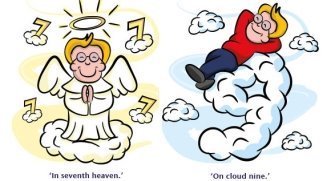
go over your head = not understand something: "The lesson went over my head – I didn't understand a word of it."
keep your head = stay calm: "He always keeps his head in a crisis."
be head over heels in love = be completely in love: "You can see that he's head over heels in love with her."
keep your head above water = manage to survive financially: "Despite the recession, they kept their heads above water."
use your head = think about something to solve a problem: "It's quite simple – just use your head!"
English idioms using 'mind'
keep / bear something in mind = remember something for future use: "I need a job in computers." "I'll bear it in mind – we often have vacancies for people with your skills."
make up your mind = decide: "I can't make up my mind about the job offer."
be in two minds about something = unable to decide: "I'm in two minds about buying a new car."
be out of your mind = be really worried: "Where have you been? I've been out of my mind with worry."
have a mind of your own = not be influenced by other people: "Don't tell me what to do! I've got a mind of my own, you know."
give someone a piece of your mind = tell someone how angry you are with them: "I'm going to give him a piece of my mind. He knows I cooked dinner for him and now he's an hour late."
English idioms: Animals
cat's whiskers = to think you are the best: "He thinks he's the cat's whiskers!"
like the cat that's got the cream = look very pleased with yourself: "He looks like the cat that's got the cream!"
cat got your tongue? = a question we ask when we think someone is guilty of something: "Why don't you say something? Cat got your tongue?"
let the cat out of the bag = tell a secret: "He shouldn't have told her about the party – he's let the cat out of the bag now."
put the cat among the pigeons = cause trouble: "Don't tell her about your promotion – that will really put the cat among the pigeons."
have kittens = panic: "The way he was driving, I was having kittens."
the bee's knees = think you're the best: "He thinks he's the bee's knees."
have a bee in your bonnet = be obsessed by something: "He's got a real bee in his bonnet about buying a new car. "
from the horse's mouth = get information from the original source: "I know they're getting married – I got it from the horse's mouth."
a white elephant = something that is expensive, but has no use: "People say the stadium is a white elephant and a waste of money."
a memory like an elephant = have an excellent memory: "She won't forget, you know. She has a memory like an elephant."
play piggy in the middle = be caught between two sides of an argument: "Because they aren't talking, I've been playing piggy in the middle."
make a pig's ear of something = make a complete mess of something: "You've made a right pig's ear of this. Let me do it!"
in hog heaven = be very happy: "We gave him flying lessons for his birthday – he was in hog heaven!"
pigs might fly! = something is as unlikely as pigs being able to fly: "Do you think the government will cut taxes?" "Pigs might fly!"
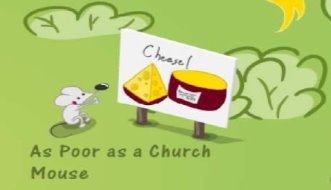 have butterflies in your stomach = be very nervous about something: "She's got butterflies in her stomach – it's her driving test today."
have butterflies in your stomach = be very nervous about something: "She's got butterflies in her stomach – it's her driving test today."
til the cows come home = do something for ever: "I can tell him til the cows come home not to be late, but he never listens."
take the bull by the horns = face a problem and take action: "I'm going to take the bull by the horns and tell him I've changed my mind."
get someone's goat = annoy someone: "It really gets my goat when she criticises him – it's not as if she's perfect herself."
a loan-shark = someone who lends money at high interest rates: "Don't borrow money from him – he's a complete loan-shark."
have a whale of a time = really enjoy yourself: "They went out and had a whale of a time."
like a fish out of water = feel very uncomfortable in a particular situation: "He feels like a fish out of water in a suit – he much prefers wearing jeans."
with your tail between your legs = feel guilty or ashamed: "He told us all that he was leaving, then he came back ten minutes later with his tail between his legs."
in the dog-house = when you know that someone is angry with you: "I'm in the dog-house – I forgot to do the shopping."
the lion's share = most of something: "She did the lion's share of the housework."
in the lion's den = in a dangerous place: "The interview was like going into the lion's den – they asked some very difficult questions."
a snake in the grass = someone who can't be trusted: "Don't tell him any secrets – he's a snake in the grass."
bug someone = irritate someone: "He's really bugging me about the holiday! I wish he'd just go away and leave me alone."
worm your way in = be nice to people so that gradually you get yourself into a good position with them: "He wormed his way into the finance department to get a job."
monkey about = play and not work: "Stop monkeying about, will you? We've got loads of work to do!"
make a mountain out of a molehill = make a big issue out of something small: "Don't worry about it – it's not important at all. You're making a mountain out of a molehill."
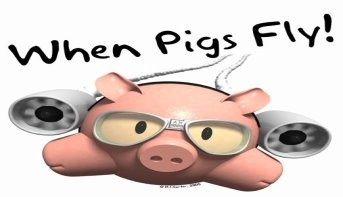
English idioms: Love
catch someone's eye = to be attractive to someone: "The shy man at the back of the class caught my eye."
to fancy someone (British English) = to find someone attractive: "My friend fancies you!"
to have a crush on someone = to only be able to think about one person: "When I was at school, I had a crush on a film star."
to have a soft spot for someone = to have a weakness for someone: "She has a soft spot for Richard – he can do anything!"
to have the hots for someone = to find someone very attractive: "She's got the hots for the new office manager."
to go out with someone (British English) = to date someone: "They've been going out together for years!"
to go steady = to go out with someone: "They've been going steady since their first year at university."
to fall for someone = to fall in love: "He always falls for the wrong types!"
to fall head over heels for someone = to completely fall in love: "He fell head over heels for her."
to be lovey-dovey = for a couple to show everyone how much they are in love: "They're so lovey-dovey, always whispering to each other and looking into each other's eyes."
to have eyes only for = to be attracted to one person only: "He's dropped all his old friends, now that he has eyes only for Susie."
to be the apple of someone's eye = to be loved by someone, normally an older relative: "She's the apple of her father's eye."
to be smitten by someone = to be in love with someone: "I first met him at a party and from that evening on, I was smitten."
a love-nest = the place where two lovers live: "They made a love-nest in the old basement flat."
to be loved-up (British English) = to exist in a warm feeling of love: "They are one loved-up couple!"
to be the love of someone's life = to be loved by a person: "He has always been the love of her life."
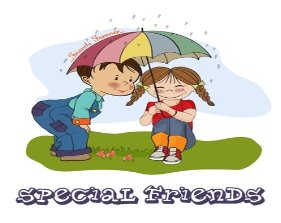
Types of love idioms
puppy love = love between teenagers: "It's just puppy love – you'll grow out of it!"
cupboard love = love for someone because they give you food: "I think my cat loves me, but it's only cupboard love!"
Getting married idioms
to get hitched: "They're getting hitched next Saturday."
to tie the knot: "So when are you two tying the knot?"
Falling out of love idioms
to go through a bit of a rough patch = when things are not going well: "Since the argument, they've been going through a bit of a rough patch."
to have blazing rows = to have big arguments: "We had a blazing row last night."
can't stand the sight of someone = to not like someone: "She can't stand the sight of him any more!"
to call it a day = to agree that the relationship has ended: "We decided to call it a day."
to be on the rocks = a relationship that is in difficulty: "Once she moved out, it was clear their marriage was on the rocks."
a love-rat = a man who betrays his girlfriend / wife: "He's had affairs with three different women – he's a complete love-rat.
English idioms: Clothes
keep something under your hat = don't say anything to anyone: "I've got something to say to you. But keep it under your hat – it's not public knowledge."
take your hat off to someone = admire someone: "I really take my hat off to people who work full time and study at the same time!"
tied to his mother's apron strings = someone (normally a man) who does what his mother tells him: "He didn't want to come out last weekend, because his mother disapproves of us. He's really tied to her apron strings!"
keep something up your sleeve = keep something hidden for later: "We've been negotiating my new pay and conditions, but I've kept the other job offer up my sleeve for the time being."
all talk no trousers – someone who talks a lot but doesn't act: "I know he told you that he would get you a limousine for the wedding. Don't believe him, though. He's all talk, no trousers."
who wears the trousers? = who has the power in a relationship: "What do you mean, she won't let you come out with us? Who wears the trousers in your house?"
pull your socks up = work harder: "You'll have to pull your socks up if you want a promotion next year."
it will blow your socks off = very hot food: "This is a fantastic stir-fry – it's hot enough to blow your socks off!"
hot under the collar = upset or angry about something: "He gets really hot under the collar about cruelty to animals – he can't stand seeing animals suffer."
it's pants (UK slang) – rubbish: "What did you think of the film?" "Pants!"
get something under your belt – achieve something: "I'm really glad I passed the driving test. Now I've got that under my belt, I can relax for a little while."
belt up = keep quiet: "What's all that noise? Just belt up, would you? I can't hear myself think."
below the belt = unfair: "You know he's really sensitive about the accident. I think it was a bit below the belt to mention it."
the boot's on the other foot = your opponent now has the advantage: "Now that she has been promoted, the boot's on the other foot! You should watch what you say from now on."
get your skates on = to hurry up: "Get your skates on – we're late as it is!"
have the shirt off your back = to steal all you own: "He asked you for how much rent? He'd have the shirt off your back, if you let him."
in only the clothes he stood up in = to only possess what you wear: "After the fire, they were left with only the clothes they stood up in."
get shirty = become angry with someone: "Don't get shirty with me! I'm only reporting the new rules."
skirt around the issue = not talk directly about something: "They skirted around the issue for a while, then got down to the real business."
cloak and dagger = mysterious: "Who's arranging the party? I don't know – it's all very cloak and dagger at the moment."
give someone a dressing down = tell someone off / reprimand someone: "He gave the whole department a dressing down after they failed to meet their agreed targets."
dressed to the nines / dressed to kill = dressed up: "Where are you going, dressed up to the nines?"
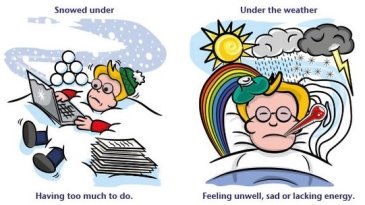
English idioms: Colour
feeling blue = feeling unhappy: "What's the matter with you? Feeling blue?"
out of the blue = completely unexpected: "I sent off my application to the company, but heard nothing. Then completely out of the blue they sent me a letter."
see red = become extremely angry: "When people are cruel to animals, it really makes me see red."
a red letter day = a day of great importance: "It's a red letter day tomorrow in the company. It's our fiftieth birthday!"
paint the town red = celebrate: "They went out last night and really painted the town red – they didn't come home until 5 a.m."
in the red = overdrawn: "It's the end of the month and we're in the red again. We have to control our spending better."
like a red rag to a bull = likely to make someone angry: "Don't talk to him about politics – it's like a red rag to a bull."
red tape = bureaucratic paperwork: "You have to cut through a lot of red tape to get proposals accepted in this company."
red carpet treatment = treat someone with great respect: "When we visit our offices in Asia, we get the red carpet treatment."
get the green light = get approval to start something: "We've finally got the green light to start research on the new product."
green fingers = be a good gardener: "Everything grows in her garden. She definitely has green fingers."
green-belt area = an area of protected land surrounding a town or city: "The green-belt area around London is disappearing fast."
green politics = environmental politics: "He's in green politics and often campaigns to fight pollution."
black market = illegal trade: "You can change dollars for a much higher rate on the black market."
black economy = a part of the economy unregulated by the authorities: "He doesn't pay any taxes and thinks that the black economy will make him rich." (He's working on the black.)
give someone a black look = look at someone as if you are angry: "Why is he giving me such a black look?"
on the black list = be on a list of "undesirables": "We won't be invited to their party this year – we're on their black list."
blacklisted = be banned: "Many actors and writers were blacklisted in Hollywood in the 1950's because they were considered "un-American."
in black and white = be extremely clear: "This contract is in black and white: we aren't allowed to keep any pets in this house."
black spot = a dangerous spot: "his roundabout is a black spot for traffic accidents."
black and blue = be badly bruised: "When she fell off her bicycle, she was black and blue for days."
white Christmas = when it snows at Christmas: "There hasn't been a white Christmas here since 1983."
whitewash = cover up the truth: "I don't believe his story. I think it's all a whitewash."
a grey area = something which is not definite: "I think genetic engineering is a bit of a grey area."
grey matter = your brain: "Doing crossword puzzles tests your grey matter."
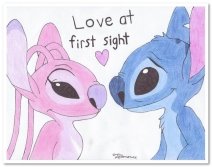

English idioms: Shape
square meal = a big meal: "After all that travelling, we needed a square meal."
be back to square one = to be back to where you started: "I don't feel we're making any progress – we're back to square one."
look someone square in the eye = look at someone directly: "He looked me square in the eye and denied taking the money."
fair and square = completely fair: "We negotiated the deal fair and square."
square up to someone = to not be scared of dealing with someone or something difficult: "I'm glad you squared up to him in the meeting – you were definitely right!"
to be square = to be old-fashioned or boring: "She's so square – she hates doing anything fun!"
square it with someone = to get someone to agree to something: "I don't know if we can afford a car – we'll have to square it with the bank first."
a square peg in a round hole = something that doesn't fit: "He shouldn't be the boss – it would be like a square peg in a round hole."
spiral out of control = a situation that gets worse all the time: "Our costs are spiralling out of control – we have to save money."
vicious circle = a situation which makes itself worse, so that there is little chance of improvement: "The two sides are locked in a vicious circle of hatred."
go round in circles = to never get out of a situation: "I feel we're not getting anywhere – we're just going round in circles."
go full circle = to go the whole distance and arrive back in the same place: "The company has now gone full circle and has returned to its original core products."
move in the same circles = know the same people socially: "I'm afraid I don't know the Queen personally – we don't move in the same circles!"
in round figures = to the nearest unit: "In round figures, he earns 80 000 USD."
round something up or down to the nearest = give the closest even amount: "How much do we owe? Well, to round it up to the nearest dollar, I'd say about 60 USD."
the first time round = the first time that you did something: "Have you ever lived in London? Yes, the first time round, I was working in a school."
do the rounds = to be circulating: "There's a new joke doing the rounds about the President."
round on someone = to turn on someone: "She suddenly rounded on him and called him a liar."
a round of sandwiches = two sandwiches (made from two pieces of bread): "She made a few rounds of cheese sandwiches."
a round of golf = a game of golf: "Fancy a round of golf this evening?"
a round of drinks = a drink for everyone: "It's my turn to buy a round of drinks. What does everyone want?"
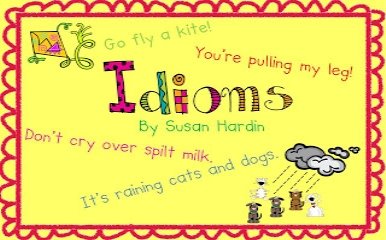
1

про публікацію авторської розробки
Додати розробку
